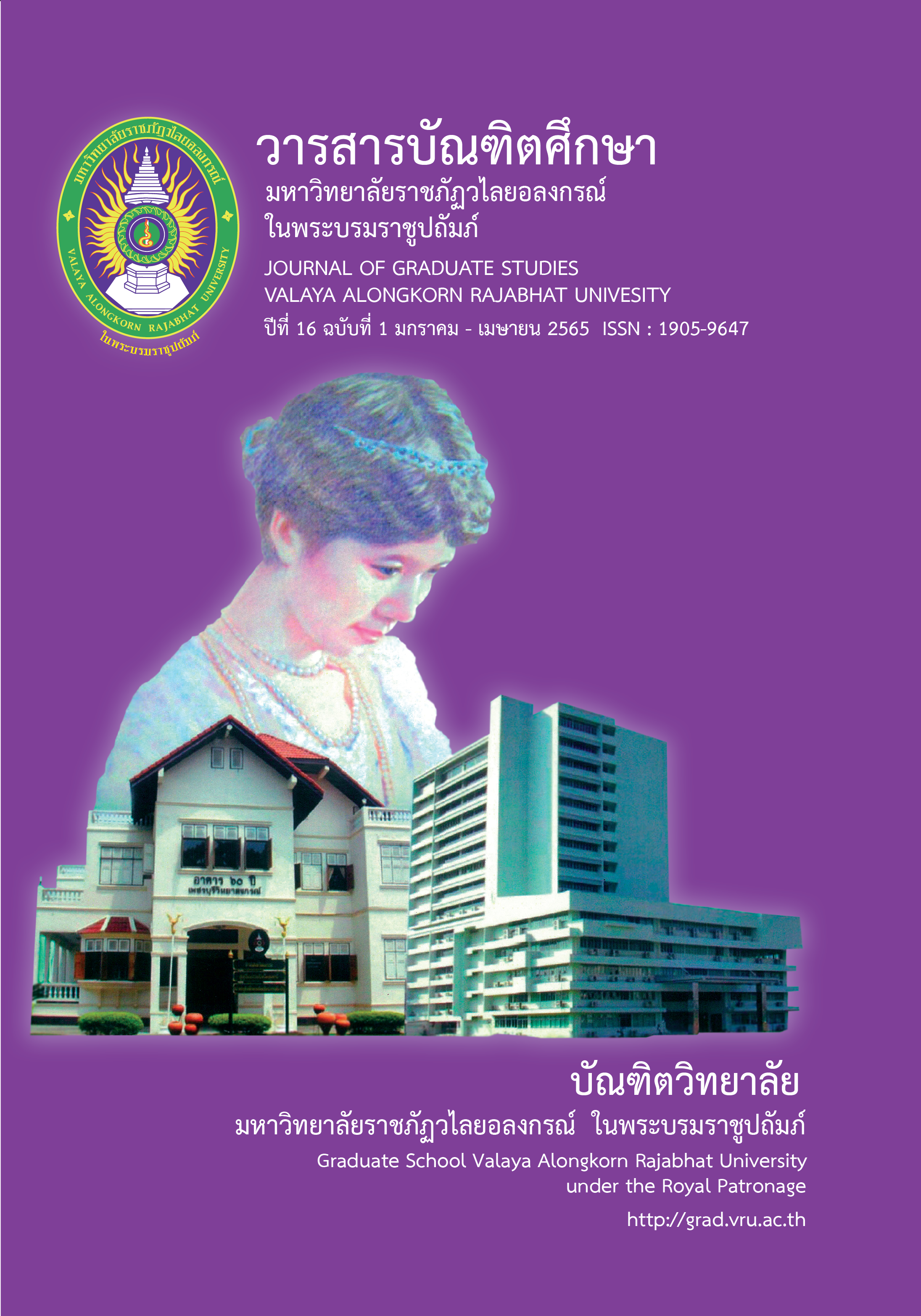A STUDY OF SCIENTIFIC CONCEPT AND SCIENTIFIC PROBLEM-SOLVING ABILITY OF MATAYOMSUKSA 3 STUDENTS BY USING DISCOVERY LEARNING METHOD THROUGH HIGHER-ORDER QUESTIONING
Main Article Content
Abstract
The purposes of this research were to 1) to compare scientific concept between before and after learning by using discovery learning method through higher-order questioning 2) to compare scientific problem-solving ability between before and after learning by using discovery learning method through higher-order questioning 3) to study gain score in scientific concept by using discovery learning method through higher-order questioning and 4) to study gain score in scientific problem-solving ability by using discovery learning method through higher-order questioning. Samples were 34 students who study in mathayomsuksa 3 of one school in Pathum Thani Primary Educational Service Area 2, randomly selected by two stages random sampling. Research instruments were 1) lesson plan which focus on discovery learning method through higher-order questioning 2) scientific concept test which reliability at 0.76, difficulty index between 0.30-0.75 and discrimination index between 0.25-0.70 3) scientific problem-solving ability test with reliability at 0.73, difficulty index between 0.30-0.80 and discrimination index between 0.20-0.70. The collected data were analyze by using mean, standard deviation, t-test, and gain score analysis.
The research findings were as follow; 1) Scientific concepts between before and after learning by discovery learning method through higher-order questioning were significantly different at the .05 level. Students had a scientific concept scores after learning higher than before learning. 2) Scientific problem-solving ability between before and after learning by discovery learning method through higher-order questioning were significantly difference at .05 level. Students had a scientific problem-solving ability after learning higher than before learning. 3) Most students learned by discovery learning method through higher-order questioning had the gain scores in scientific concept at moderate level. 4) Most students learned by discovery learning method through higher-order questioning had the gain scores in scientific problem-solving ability at moderate level and basic level.
Article Details

This work is licensed under a Creative Commons Attribution-NonCommercial-NoDerivatives 4.0 International License.
บทความทุกเรื่องได้รับการตรวจความถูกต้องทางวิชาการโดยผู้ทรงคุณวุฒิ ทรรศนะและข้อคิดเห็นในบทความ Journal of Global of Perspectives in Humanities and Social Sciences (J-GPHSS) มิใช่เป็นทรรศนะและความคิดของผู้จัดทำจึงมิใช่ความรับผิดชอบของบัณฑิตวิทยาลัย มหาวิทยาลัยราชภัฏวไลยอลงกรณ์ ในพระบรมราชูปถัมภ์ กองบรรณาธิการไม่สงวนสิทธิ์การคัดลอก แต่ให้อ้างอิงแหล่งที่มา
References
Boonfan, W. & Haemaprasith, S. (2018). phonkānchai rūpbǣp kānčhat kitčhakam kānrīanrū bǣp sư̄pso̜ hākhwām rū hā khantō̜n ( hā Es ) rūam kap kānchai kham thām radap sūng thī mī tō̜ khwāmsāmāt nai kānhai hētphon læ manō that thāng khanittasāt khō̜ng nakrīan chan matthayommasưksā pī thī sī [Effects of Discovery Learning Emphasizing Critical Problem Solving on the Learning Avidity and Science Achievement of Sixth Grade Students]. Retrieved from https://edu.msu.ac.th/journal/home/journal_file/408.pdf
Brown, E. (2006). Discovery learning in the classroom. Retrieved from https://www.researchgate.net/publication/305174476
Chimmalee, B. (2007). phon khō̜ng kānčhat kitčhakam khanittasāt dōi chai kham thām radap sūng prakō̜p nǣothāng phatthanā khwāmkhit thāng khanittasāt khō̜ng frāi winlik thī mī tō̜ khwāmsāmāt nai kān kǣ panhā khanittasāt læ kān khit yāng mī wičhāranayān khō̜ng nakrīan chan prathomsưksā pī thī sām [Effects of using higher order questions in organizing mathematics activities based on Fraivillig’s approach of advancing children’s mathematical thinking on mathematics problem solving ability and critical thinking ability of ninth grade students]. Master’s thesis in Mathematics Education, Chulalongkorn University.
Davis, B. G. (2020). Asking questions: tools for teaching. Retrieved from https://www.indiana.edu/~istr695/readingsfall2013/Tools%20For%20Teaching.pdf
Dechakupt, P. & Yindeesuk, P. (2018). kānrīanrū chœ̄ng ruk bǣp ngō̜kap PLC phư̄a kānphatthanā [Collaborative Active Learning with PLC for Development]. Bangkok: Chulalongkorn Printing House.
Eisenberg, M. (2001). Discovery Learning, Cognitive Psychology. International Encyclopedia of the Social & Behavioral Sciences, 3736–3739. doi:10.1016/b0-08-043076-7/01473-x.
Haslam, F. & Tregust, D. F. (1987). Diagnosing secondary student misconceptions of photosynthesis and respiration in plant using a two-tier multiple-choice instrument. Retrieved from https://www.researchgate.net/publication/234647942_Diagnosing_Secondary_Students'_Misconceptions_of_Photosynthesis_and_Respiration_in_Plants_Using_a_Two-Tier_Multiple_Choice_Instrument
IPST. (2020). phonkān pramœ̄n PISA sō̜ngphansippǣt nakrīan Thai wai siphā pī rū læ tham ʻarai daibāng [PISA 2018 Results: What Thai Students (15 Years old) Know and Can Do]. Retrieved from https://pisathailand.ipst.ac.th/issue-2019-48/
Kanjanawasri, S. (2013). thritsadī kānthotsō̜p bǣp dangdœ̄m [Classical Testing Theory]. Bangkok: Chulalongkorn Printing House.
Kongboonma, S. & Chamnankit, N. (2015). phonlakā rot ʻon bǣp khon phop rō̜wō̜ makap theknik kān rīan bǣp rūammư̄ thī mī tō̜ phon samrit thāngkān rīan khanittasāt læ khwām khongthon nai kānrīanrū khō̜ng nakrīan chan matthayommasưksā pī thī nưng [The Effect of Teaching Mathematics by the Discovery Method with Cooperative Learning Technique on Mathematics Achievement and Retention of Mathayomsuksa I Students]. Retrieved from https://so02.tci-thaijo.org/index.php/JGNRU/article/view/43879
Kowtrakul, S. (2009). čhittawitthayā kānsưksā [Educational Psychology]. Bangkok: Chulalongkorn Printing House.
Makanong, A. (2010). thaksa læ krabūankān thāng khanittasāt : kānphatthanā phư̄a phatthanākān [Mathematical Skills and Processes: Developing for Growth]. Bangkok: Faculty of Education, Chulalongkorn University.
Ministry of Education. (2008). tūa chī wat læ sāra kānrīanrū kǣn klāng klum sāra kānrīanrū witthayāsāt (chabap prapprung sō̜ngphanhārō̜ihoksip) tām laksūt kǣn klāng kānsưksā naphư̄n thān Phutthasakkarāt sō̜ngphanhārō̜ihāsipʻet [Indicator and Core Learning Content of Science Learning Area (Revise Edition B.E.2560) According to Basic Education Core Curriculum B.E.2551]. Bangkok: Agricultural Cooperative of Thailand Printing House Limited.
Natenimit, D., Angganapattarakajorn, V., & Promarak, P. (2015). phonkānchai rūpbǣp kānčhat kitčhakam kānrīanrū bǣp sư̄pso̜ hākhwām rū hā khantō̜n (hā Es) rūam kap kānchai kham thām radap sūng thī mī tō̜ khwāmsāmāt nai kānhai hētphon læ manō that thāng khanittasāt khō̜ng nakrīan chan matthayommasưksā pī thī sī [The Effect of Instructional Inquiry Model (5Es) and High-Order Questions on Mathematical Reasoning Ability and Mathematical Concepts of Function of Mathayomsuksa fourth Students]. Retrieved from http://digital_collect.lib.buu.ac.th/dcms/files/56910184.pdf
Nilphan, M. (2008). withī wičhai thāng phrưttikam sāt læ sangkhommasāt [Research of Behavioral and Social Science]. Nakon-Pahom: Faculty of Education, Silpakorn University
Schunk, D. H. (2012). Learning theories: an educational perspective. Boston: Pearson Education.
The National Institute of Educational Testing Service. (2019). rāingān phon sō̜p [Report of O-NET Testing Statistics]. Retrieved from http://www.newonetresult.niets.or.th/
Wongyai, W. (2006). phalang kānrīanrū nai krabūan that mai [Power of Learning in the New Paradigm]. Bangkok: S.R.Printing.
Wongyai, W. & Patpol, M. (2019). kān khōt phư̄a phatthanā sakkayaphāp phū rīan [Coaching for Developing Learner’s Potential]. Bangkok: Charansnidvongs Printing


